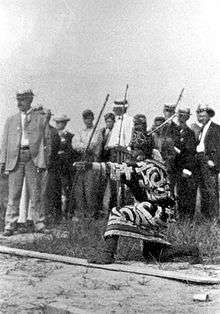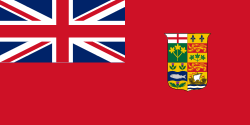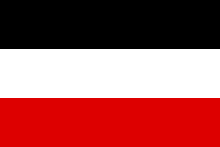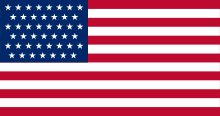1904 Summer Olympics
 | |
| Host city | St. Louis, Missouri, United States |
|---|---|
| Nations participating | 12 |
| Athletes participating | 651 (645 men, 6 women)[1] |
| Events | 94 in 16 sports |
| Opening ceremony | July 1 |
| Closing ceremony | November 23 |
| Officially opened by | David Francis |
| Stadium | Francis Field |
The 1904 Summer Olympics, officially known as the Games of the III Olympiad, was an international multi-sport event which was celebrated in St. Louis, Missouri, in the United States from August 29 until September 3, 1904, as part of an extended sports program lasting from July 1 to November 23, 1904, at what is now known as Francis Field on the campus of Washington University in St. Louis. It was the first time that the Olympic Games were held in a majority English language nation, and the first time that they were held outside of Europe.[2]
Background
The city of Chicago, Illinois originally won the bid to host the 1904 Summer Olympics,[3] but the organizers of the Louisiana Purchase Exposition in St. Louis would not accept another international event in the same time frame. The exposition organization began to plan for its own sports activities, informing the Chicago OCOG that its own international sports events intended to eclipse the Olympic Games unless they were moved to St. Louis. Pierre de Coubertin, the founder of the modern Olympic movement, gave in and awarded the games to St. Louis.
The Games
St. Louis organizers treated the games in a manner similar to the 1900 Summer Olympics in Paris. Competitions were reduced to a side-show of the World's Fair and were overshadowed by other, more popular cultural exhibits. David R. Francis, the President of the Louisiana Purchase Exposition, declined to invite anybody else to open the Games and, on July 1 did so himself.
Officially, the games lasted for four and a half months; in fact, James Edward Sullivan attempted a sporting event every day for the duration of the fair. The Olympic-calibre events were mixed with other sporting events that Sullivan also called "Olympic." The IOC later declared that 94 of these events were Olympic. The actual athletics events that formed the bulk of the recognised Olympic sports were held from Monday, August 29 to Saturday, September 3.
The participants totalled 651 athletes – 645 men and 6 women representing 12 countries. However, only 42 events (less than half) actually included athletes who were not from the United States.
Highlights

European tension caused by the Russo-Japanese War and the difficulty of getting to St. Louis kept many of the world's top athletes away. In a number of sports, because there were no competitors from other nations, the U.S. national championship was combined with the Olympic championship (and other events such as a local YMCA swim competition). Boxing, dumbbells, freestyle wrestling and the decathlon made their debuts. The swimming events were held in a temporary pond near Skinker and Wydown Boulevards, where "lifesaving demonstrations" took place of unsinkable lifeboats for ocean liners. The organizers of the World's Fair held "Anthropology Days" on August 12 and 13. Various indigenous men from around the world, who were at the World's Fair as part of the Department of Ethnology exhibits, competed in various events for anthropologists to see how they compared to the white man.

One of the most remarkable athletes was the American gymnast George Eyser, who won six medals even though his left leg was made of wood. Frank Kugler won four medals in freestyle wrestling, weightlifting and tug of war, making him the only competitor to win a medal in three different sports at the same Olympic Games. Chicago runner James Lightbody won the steeplechase and the 800 m and then set a world record in the 1500 m. Harry Hillman won both the 200 m and 400 m hurdles and also the flat 400 m. Sprinter Archie Hahn was champion in the 60 m, 100 m and 200 m. In this last race, he set an Olympic record in 21.6, a record that stood for 28 years. In the discus, after American Martin Sheridan had thrown exactly the same distance as his compatriot, Ralph Rose (39.28 m), the judges gave them both an extra throw to decide the winner. Sheridan won the decider and claimed the gold medal. Ray Ewry again won all three standing jumps.
The team representing Great Britain was awarded a total of two medals, both won by Irish athletes. The top non-USA athlete was Emil Rausch of Germany, who won three swimming events. Zoltan Halmay of Hungary and Charles Daniels of the United States each won two swimming gold medals. Galt Football Club from Canada won the gold medal in football.
Marathon
The marathon was the most bizarre event of the Games. It was run in brutally hot weather, over dusty roads, with horses and automobiles clearing the way and creating dust clouds. The first to arrive at the finish line was Frederick Lorz, who actually rode the rest of the way in a car to retrieve his clothes, after dropping out after nine miles. The car broke down at the 19th mile, so he re-entered the race and jogged back to the finish line. When the officials thought he had won the race, Lorz played along with his practical joke until he was found out shortly after the medal ceremony and was banned for a year by the AAU for this stunt, later winning the 1905 Boston Marathon.[4]
Thomas Hicks (a Briton running for the United States) was the first to cross the finish-line legally, after having received several doses of strychnine sulfate (a common rat poison, which stimulates the nervous system in small doses) mixed with brandy from his trainers. He was supported by his trainers when he crossed the finish, but is still considered the winner. Hicks had to be carried off the track, and possibly would have died in the stadium, had he not been treated by several doctors. A Cuban postman named Felix Carbajal joined the marathon, arriving at the last minute. He had to run in street clothes that he cut around the legs to make them look like shorts. He stopped off in an orchard en route to have a snack on some apples which turned out to be rotten. The rotten apples caused him to have to lie down and take a nap. Despite falling ill from the apples, he finished in fourth place.[5][6]
The marathon included the first two black Africans to compete in the Olympics: two Tswana tribesmen named Len Tau (real name: Len Taunyane) and Yamasani (real name: Jan Mashiani). They were not in St. Louis to compete in the Olympics, however; they were actually part of the sideshow. They had been brought over by the exposition as part of the Boer War exhibit (both were really students from Orange Free State in South Africa, but this fact was not made known to the public). Len Tau finished ninth and Yamasani came in twelfth. This was a disappointment, as many observers were sure Len Tau could have done better if he had not been chased nearly a mile off course by aggressive dogs.[4]
Arriving without correct documents, Frenchman Arthur Coray was not included as part of the French team.[4] He is inconsistently listed as performing in a mixed team in the four mile team race and performing for the US in the marathon.[4]
Sports

94 events[7] in 17 disciplines, comprising 16 sports, were part of the Olympic program in 1904. Swimming and diving are considered two disciplines of the same sport, aquatics. The number of events in each discipline is noted in parentheses.
 Basketball ,
Basketball ,  Hurling and
Hurling and  Baseball were featured as demonstration sports.
Baseball were featured as demonstration sports.  Water polo is mentioned in the games reports for the 1904 Summer Olympics but currently is not included in the IOC's medal database and retrospectively considered by IOC as demonstration sport as well.
Water polo is mentioned in the games reports for the 1904 Summer Olympics but currently is not included in the IOC's medal database and retrospectively considered by IOC as demonstration sport as well.
Venues
- Creve Coeur Lake – Rowing
- Francis Field – Archery, Athletics, Cycling, Football, Gymnastics, Lacrosse, Roque, Tennis, Tug of war, Weightlifting, and Wrestling
- Francis Gymnasium – Boxing, Fencing
- Forest Park – Diving, Swimming, and Water polo.
- Glen Echo Country Club – Golf
Participating nations

Blue = Participating for the first time
Green = Have previously participated.
Yellow square is host city (St Louis)

Athletes from twelve nations competed in St. Louis. Numbers in parentheses indicate the number of known competitors for each nation.[8] Due to the difficulty of getting to St. Louis, and European tensions caused by the Russo-Japanese War, only 52 athletes from outside of North America came to the Olympics.
-
.svg.png) Australia (3)
Australia (3) -
 Austria (2)
Austria (2) -
 Canada (56)
Canada (56) -
 Cuba (3)
Cuba (3) -
 France (1)[4]
France (1)[4] -
 Germany (22)
Germany (22) -
 Great Britain (6)
Great Britain (6) -
.svg.png) Greece (14)
Greece (14) -
.svg.png) Hungary (4)
Hungary (4) -
 South Africa (8)
South Africa (8) -
 Switzerland (2)
Switzerland (2) -
 United States (526)
United States (526)
Disputed
Some sources also list athletes from the following nations as having competed at these Games.
-
 Italy (1)[9]
Italy (1)[9] -
 Norway (2)[10]
Norway (2)[10] -
 Newfoundland (1)[11]
Newfoundland (1)[11]
Medal count
These are the top ten nations to win medals at the 1904 Games.

| Rank | Nation | Gold | Silver | Bronze | Total |
|---|---|---|---|---|---|
| 1 | | 78 | 82 | 79 | 239 |
| 2 | | 4 | 4 | 5 | 13 |
| 3 | | 4 | 2 | 3 | 9 |
| 4 | | 4 | 1 | 1 | 6 |
| 5 | | 2 | 1 | 1 | 4 |
| 6 | | 1 | 1 | 0 | 2 |
| | 1 | 1 | 0 | 2 | |
| 8 | | 1 | 0 | 1 | 2 |
| | 1 | 0 | 1 | 2 | |
| 10 | | 0 | 0 | 1 | 1 |
The nationalities of many medalists are disputed as many competitors were recent immigrants to the United States who had not yet been granted US citizenship.
In 2009, historians from the International Society of Olympic Historians discovered that cyclist Frank Bizzoni formerly thought to be an American athlete was still an Italian citizen when he competed in 1904.[12]
The International Olympic Committee considers Norwegian-American wrestlers Charles Ericksen and Bernhoff Hansen to have competed for the United States; each won a gold medal. In 2012, Norwegian historians however found documentation showing that Ericksen did not receive American citizenship until March 22, 1905, and that Hansen, who was registered as an "alien" as late as 1925, probably never received American citizenship. The historians have therefore petitioned to have the athletes registered as Norwegians.[13][14] In May 2013 it was reported that the Norwegian Olympic Committee had filed a formal application for changing the nationality of the wrestlers in IOC's medal database.[15]
The Australian Olympic Committee claims Francis Gailey as an Australian rather than an American as per the IOC records. He won three silver medals and a bronze in swimming.
Multi-medalist Frank Kugler is recognised as an American by the IOC although he was a German national at the time of the Games. . The same applies to Swiss national Gustav Thiefenthaler.
The IOC also lists French-American Albert Corey as a United States competitor for his marathon silver medal, but (together with four undisputed Americans) as part of a mixed team for the team race silver medal. Other sources list these athletes as competitors for their country of birth rather than the United States.
See also
- Olympic Games celebrated in the United States
Notes
- ↑ "The Olympic Summer Games Factsheet" (PDF). International Olympic Committee. Retrieved August 5, 2012.
- ↑ Christen, Barbara S.; Steven Flanders (November 2001). Cass Gilbert, Life and Work: Architect of the Public Domain. W. W. Norton & Company. p. 257. ISBN 978-0-393-73065-4. Retrieved June 8, 2008.
- ↑ Stead, W. T. (1901). The Americanization of the World. Horace Markley. p. 341.
- 1 2 3 4 5 Cronin, Brian (August 10, 2010). "Sports Legend Revealed: A marathon runner nearly died". Los Angeles Times (Los Angeles). Retrieved August 31, 2010.
- ↑ Abbott, Karen. "The 1904 Olympic Marathon May Have Been the Strangest Ever". Smithsonian.com. Retrieved 8 April 2015.
- ↑ Martin, David E.; Gynn, Roger W. H. (2000). The Olympic Marathon. p. 50. ISBN 9780880119696.
- ↑ The IOC site for the 1904 Olympic Games gives erroneous figure of 91 events, while the IOC database lists 94 ones. Probably this discrepancy in IOC data is consequence that the figure 91 just derived from the "1904 Olympic Games — Analysis and Summaries" publication of Bill Mallon, who used his own determination of which sports and events should be considered as Olympic.
- ↑ Mallon, Bill (1998). "1904 Olympic Games — Analysis and Summaries" (PDF). LA84 Foundation. Archived (PDF) from the original on July 8, 2011. Retrieved August 8, 2011.
- ↑ "Italy at the 1904 St. Louis Summer Games". Sports Reference.
- ↑ "Norway at the 1904 St. Louis Summer Games". Sports Reference.
- ↑ "Newfoundland at the 1904 St. Louis Summer Games". Sports Reference.
- ↑ Historical Dictionary of the Olympic Movement - Italy. books.google.com. Retrieved 31 July 2014.
- ↑ "Her er beviset som endrer norsk idrettshistorie". NRK. August 14, 2012.
- ↑ "USA-guld 1904 var Norges". Svenska Dagbladet. August 14, 2012.
- ↑ "Norges OL-historie skrives på nytt". Nettavisen. May 3, 2013.
References
- "St Louis 1904". Olympic.org. International Olympic Committee.
- "Results and Medalists". Olympic.org. International Olympic Committee.
- The Olympic Games 1904, Charles J.P. Lucas
- Spalding's Athletic Almanac for 1905
External links
| Wikimedia Commons has media related to 1904 Summer Olympics. |
- "St Louis 1904". Olympic.org. International Olympic Committee.
- Competitions on Anthropology Days
- Photos of the 1904 Olympics from the Missouri History Museum
- the memory palace podcast episode about 1904 olympic marathon
| Preceded by Paris |
Summer Olympic Games St. Louis III Olympiad (1904) |
Succeeded by London |
| ||||||
| ||||||
|
